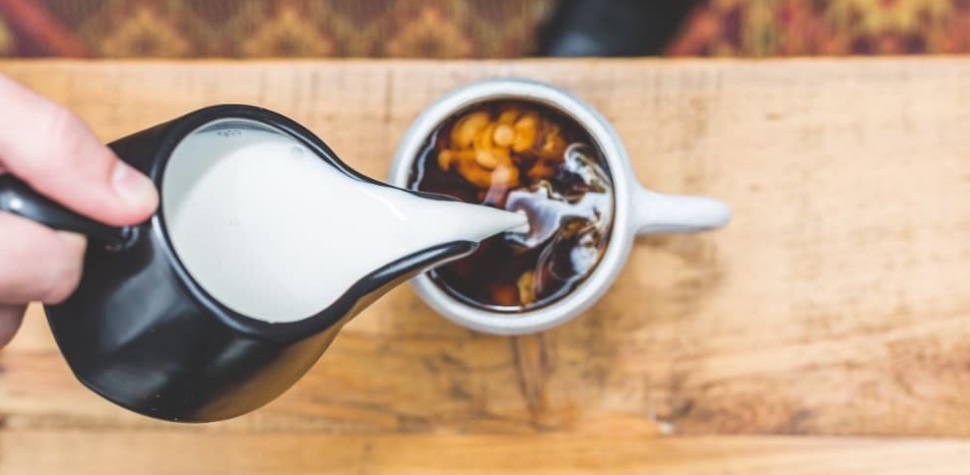
When it comes to enjoying a good cup of coffee, many of us like to add a splash of milk for flavor and texture. But there’s a common query whether this addition affects the caffeine content, which is crucial for those monitoring their intake for health reasons. So, does adding milk to coffee reduce its caffeine content? Let’s delve into this intriguing question and uncover some essential insights.
Key Takeaways about Adding Milk To Coffee reduce Caffeine or not
- Caffeine Content Remains Unchanged: Despite popular belief, adding milk to coffee does not reduce its caffeine content. The stimulating effects of your coffee will remain the same.
- Sensory Changes: While milk does not affect the caffeine levels, it does alter the coffee’s texture and taste. This can affect how strong the coffee seems, but not its actual strength.
- Natural Caffeine Reduction: If you’re looking to reduce your caffeine intake, consider other methods like choosing different types of beans or adjusting your brewing techniques, rather than adding milk.
Understanding Caffeine in Coffee
Caffeine is a natural stimulant found in coffee beans, known for its ability to keep us awake and alert. But how much caffeine ends up in your coffee cup can vary greatly depending on several factors:
Types of Coffee Beans
- Arabica vs. Robusta: Arabica beans are widely preferred for their smoother, more aromatic flavor but typically have less caffeine compared to the robust and more bitter Robusta beans.
Brewing Methods
- Extraction: The method you use to brew your coffee plays a crucial role in how much caffeine is extracted. Espresso machines, for instance, force hot water through finely-ground coffee, extracting a lot of caffeine in a short burst, whereas a French press, which steeps the grounds in hot water for several minutes, might extract more caffeine over a longer period.
Role of Milk in Coffee
When you add milk to coffee, it’s not just about taste and texture; there’s actual chemistry happening in your cup. Milk can alter the acidity and bitterness of coffee, making your morning brew smoother and sometimes easier on the stomach.
- Acidity: Coffee naturally contains acids, which can sometimes lead to digestive discomfort. Milk has a higher pH level than coffee, which means it can neutralize some of the acidity. This makes the coffee less harsh on your digestive system.
- Bitterness: The proteins in milk, especially casein, can bind to bitter-tasting compounds in coffee such as tannins. This binding reduces the overall bitterness, making the coffee taste smoother.
Nutritional Contributions
Milk isn’t just a flavor enhancer—it also brings its own nutritional benefits to your coffee:
- Calcium and Vitamins: Adding milk, especially cow’s milk, can contribute calcium and vitamins D and B12 to your diet.
- Proteins and Fats: Milk adds a small amount of protein and, depending on the type used (whole, skim, etc.), can add varying levels of fat. These help in making the coffee more satiating.
Does Adding Milk Change Caffeine Content?
There’s a widespread belief that adding milk might reduce the caffeine content of coffee. This misunderstanding might stem from the sensory changes that milk brings—because it makes coffee taste milder, some assume it also cuts down on caffeine.
The Reality
Multiple studies and expert opinions clarify that milk does not affect the caffeine level in coffee. Caffeine, a water-soluble compound, is extracted from coffee beans during the brewing process. Once it’s in your cup, it remains unaffected by the addition of milk.
Caffeine Stability: Caffeine’s chemical structure and solubility ensure that its levels remain stable whether milk is present or not.
Expert Insights: Researchers in food science have tested and confirmed that the interaction between milk proteins and coffee does not extend to altering caffeine’s stimulatory effects.
Effective Methods to Reduce Caffeine
If you’re looking to cut down on caffeine but still enjoy your coffee, there are several effective methods you can employ. From selecting the right type of coffee beans to adjusting your brewing techniques, here’s how you can manage caffeine intake without sacrificing the joy of a good cup of joe.
Choosing the Right Type of Coffee
The type of coffee bean you choose has a significant impact on the caffeine content of your brew.
Arabica vs. Robusta: Arabica beans are known for their smooth and aromatic flavor and generally contain less caffeine than Robusta beans. Robusta, on the other hand, is stronger and more bitter but packs almost double the caffeine of Arabica. If you’re caffeine-sensitive, opting for Arabica beans can be a good start.
Light vs. Dark Roasts: There’s a common misconception that darker roasts have more caffeine because of their robust flavor. However, light roasts actually retain more caffeine because the roasting process is shorter, and less caffeine is burned off. If you prefer a milder cup but need to manage your caffeine levels, a dark roast might be the way to go.
Adjusting Brewing Time and Coffee Grounds
How you brew your coffee can also influence caffeine content. Here are a couple of tweaks you can make:
The longer coffee brews, the more caffeine is extracted. So, if you’re looking to reduce caffeine intake, shorten the brewing time. For instance, espresso, despite its strong flavor, has less caffeine per serving compared to a slowly brewed drip coffee because of the quick extraction process.
Using fewer coffee grounds, or adjusting the grind size, can decrease the caffeine content in your cup. A coarser grind results in slower caffeine extraction during brewing. Similarly, simply reducing the amount of coffee grounds while keeping the water quantity constant can dilute the caffeine concentration.
Consideration of Coffee Blends and Decaffeinated Options
Mixing different types of coffee beans or choosing a decaffeinated option can further help manage your caffeine intake:
Combining regular coffee beans with decaffeinated beans can significantly reduce the overall caffeine content while maintaining the flavor and body of the brew. This is ideal for those who enjoy the taste of strong coffee but want to limit their caffeine consumption.
While not entirely caffeine-free, decaffeinated coffee offers a substantial reduction in caffeine. The decaffeination process typically removes about 97% of the caffeine, making it a viable option for those looking to cut down drastically. It’s important to choose a quality decaf to ensure that the flavor remains as satisfying as regular coffee.
Impact of Milk on Coffee Experience
Adding milk to coffee significantly alters its sensory properties:
- Taste: Milk reduces the bitterness of coffee by binding with bitter compounds, which can make the coffee feel smoother and sweeter to some palates.
- Texture: The creaminess of milk changes the body and mouthfeel of coffee, making it richer and more velvety.
- Temperature: Milk cools down the coffee, which can make it more immediately enjoyable and reduce the risk of burns.
Health Considerations
While milk enhances flavor and texture, it also brings nutritional benefits and some drawbacks:
- Benefits: Milk adds essential nutrients like calcium and protein to coffee, potentially enhancing its nutritional profile.
- Drawbacks: For those monitoring calorie intake or with lactose intolerance, adding milk could pose dietary challenges.
FAQs
Does Milk Affect the Rate of Caffeine Absorption?
No, milk does not significantly alter how quickly or effectively caffeine is absorbed in the body. The stimulant effects of caffeine remain largely unchanged.
How Does the Type of Milk Affect Coffee?
- Whole Milk: Offers a creamier texture and richer flavor but higher in calories.
- Skim Milk: Less creamy with fewer calories.
- Plant-based Milks: Almond, soy, and oat milks vary in creaminess and flavor, and can alter the taste profile of your coffee significantly.
Can Milk Alter the Health Benefits of Coffee?
While milk doesn’t negate the benefits of coffee, such as its antioxidants, it can add or subtract nutritional values depending on the type of milk. For instance, adding whole milk increases fat and calorie content, whereas plant-based milks might add less fat but also fewer nutrients unless fortified.
Final Thoughts
While adding milk to coffee transforms its taste, texture, and temperature, it does not reduce the caffeine content. For those looking to modify their coffee experience or manage their caffeine intake, exploring different types of milk or brewing methods can be a beneficial experiment.









